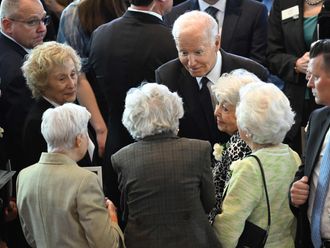Dubai: Secrets talks over ‘safe zones’ in Syria were held between Israel, the United States and Russia in early July, Haaretz reported Wednesday.
During the meetings, Israel reportedly expressed objection to a cease fire deal, later announced by the United States and Russia.
According to the report, Israel asserted the powers should focus on eliminating Iran’s involvement in Syria.
The secret talks were held in Amman and an unnamed European capital.
Officials who asked to remain anonymous told Haaretz that top members of Israeli government and security forces took part in the meetings including representatives from the Israeli Mossad and Ministry of Defense.
The ceasefire deal was announced on July 8 after an eagerly anticipated first meeting between US President Donald Trump and his Russian counterpart Vladimir Putin on the sidelines of the G20 summit in Hamburg, Germany.
Americans and Russians were focused on establishing safe zones in the region in order to concentrate on defeating Daesh while Israel thought, tactically, the powers should be focused on a longer term strategy and removing Iran’s influence from the region.
Israeli officials reportedly told the Americans and Russians that they should demand Iranians, the Revolutionary Guards, Hezbollah and the Shiite militias leave Syria.
Israel argued that, if Iran remained in Syria, it would become a base for missiles being launched into Israel and Jordan.
When the Americans and the Russians announced the ceasefire agreement on July 8, Israeli officials were reportedly shocked to discover that it contradicted all the points Israel had argued for during the meetings.
Israeli Prime Minister Benjamin Netanyahu on July 16 voiced his opposition to the safe zone agreement to reporters following a meeting in France with President Emmanuel Macron.
Following US President Donald Trump’s meeting with Russian President Vladimir Putin at the G20 summit in Hamburg earlier in July, Mr. Trump tweeted: “We negotiated a ceasefire in parts of Syria which will save lives. Now it is time to move forward in working constructively with Russia!”
White House advisor Sebastian Gorka said during an interview with CNN’s Jake Tapper that the ceasefire had been negotiated with “Israel, with Jordan involved,” and an administration official later clarified to The Jerusalem Post that the Israelis were “not a party to it, but were consulted.”
The Kremlin had also said Putin had been in touch with Netanyahu over the deal.
Netanyahu, however, was reportedly outraged by the arrangement, in a sign that Israeli concerns were not taken into account.
Israel viewed the ensuing conditions as advantageous to the Iranians who are seeking to expand their influence in the area.
Israeli officials added that Israel believes that Iran has ambitious plans to set up a military foothold in the region, possibly including an airbase and naval base, which would be “game-changers.”
It now transpires that during the conversations held by the US and Russia with Israel over the ceasefire, Israel had expressed many reservations about the security implications of the deal, and the Israelis now feel that their concerns about Iran, Hezbollah and other Shiite militias were swept aside and not addressed.












